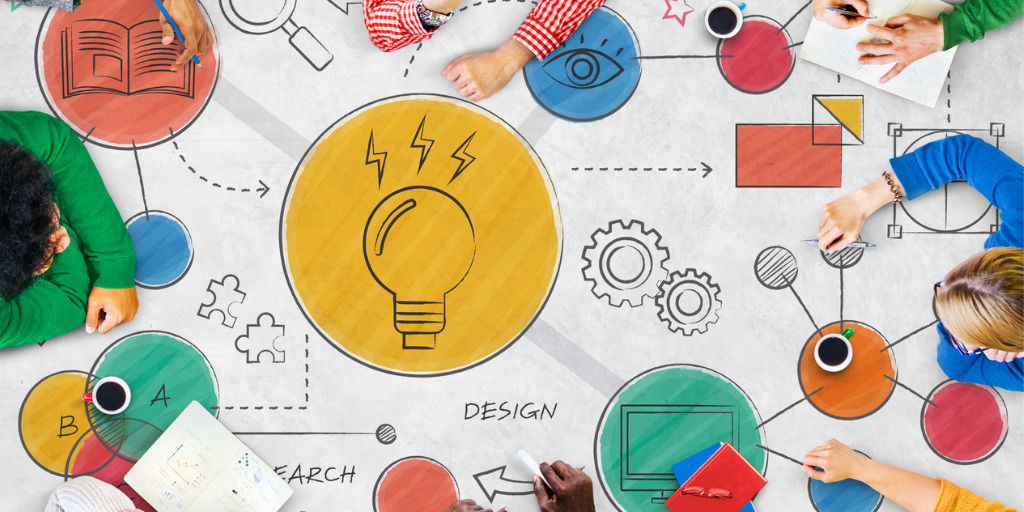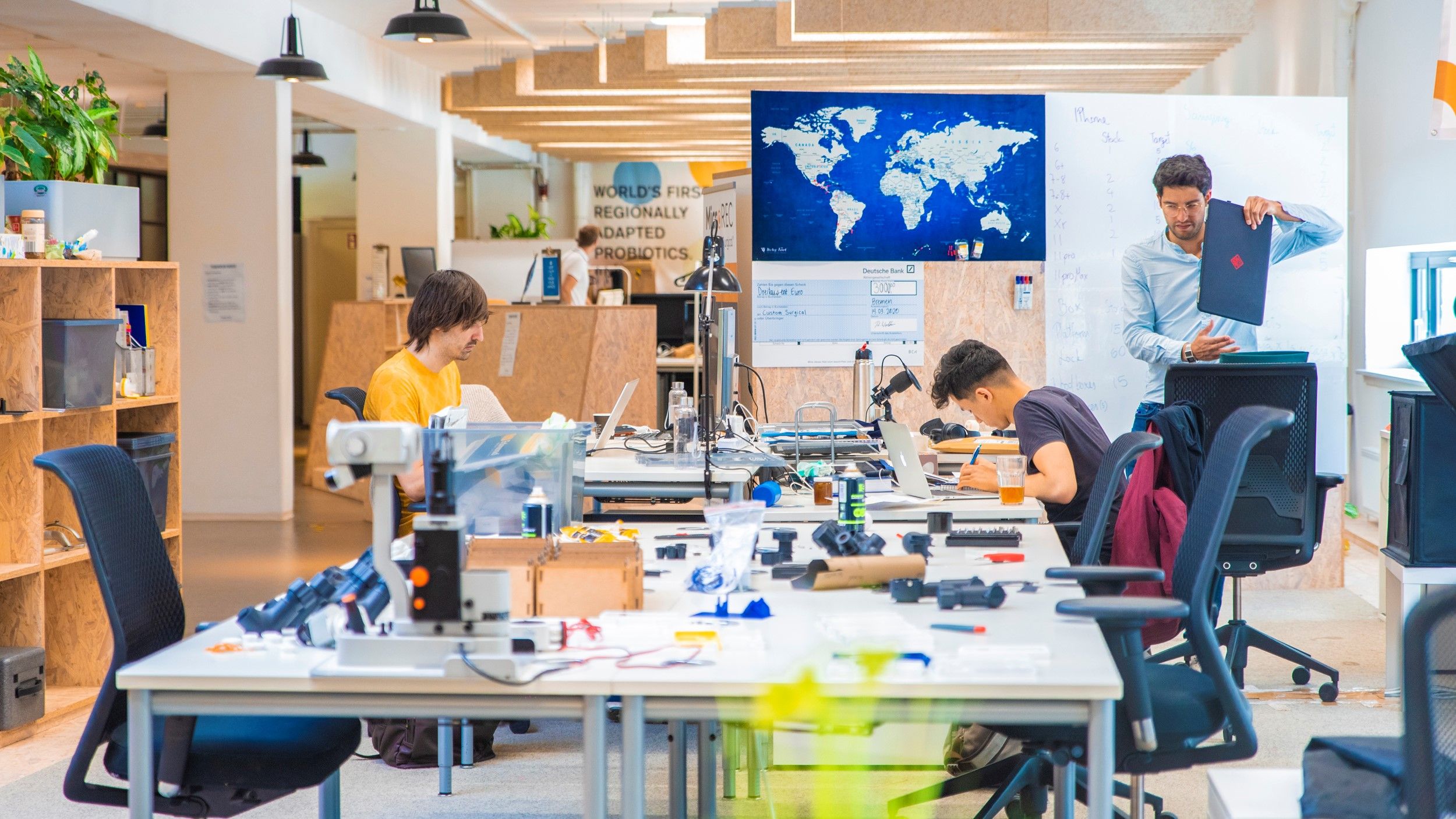Sector in brief
Climate change presents humanity with a global challenge. Increasing environmental pollution is endangering the supply of clean water, clean air and uncontaminated soil to the population worldwide. Biodiversity is declining rapidly. A change in the way we live and do business is of major importance to counter these problems.
One path to a sustainable way of life and economy is the bioeconomy. This envisages a fundamental structural change: An economy based on fossil raw materials is to be continuously transformed into a sustainable and bio-based circular economy based on renewable raw materials. The circular economy is an essential element in achieving the efficient use of renewable raw materials. The bioeconomy is based on natural material cycles, consistently uses residual and waste materials and takes into account the limitation of natural resources.
Replacing fossil fuels with renewable raw materials has many economic advantages. Bioeconomic innovations create new jobs and reduce dependence on fossil resources. Regional value chains are gaining importance and the worth of domestic raw materials is being reaffirmed. Agriculture and forestry, in particular, are being strengthened as producers of renewable raw materials. Due to the cross-industry nature of the bioeconomy, however, this also applies to many other core Bavarian industries. Stable and sustainable jobs will be created in the food, wood, paper, leather, textile and chemical industries, as well as in the energy and waste disposal sectors.
![[Translate to English:]](https://ik.imagekit.io/sgliwi1izsz/media/images/team_2021/mitarbeiter/Katinka-Uppendahl.png?tr=w-1024 1024w, https://ik.imagekit.io/sgliwi1izsz/media/images/team_2021/mitarbeiter/Katinka-Uppendahl.png?tr=w-1280 1280w, https://ik.imagekit.io/sgliwi1izsz/media/images/team_2021/mitarbeiter/Katinka-Uppendahl.png?tr=w-1536 1536w, https://ik.imagekit.io/sgliwi1izsz/media/images/team_2021/mitarbeiter/Katinka-Uppendahl.png?tr=w-1920 1920w)
Katinka Uppendahl
Investor Services Life Sciences
+49 89 24210 7508 katinka.uppendahl@invest-in-bavaria.de
Rosenheimer Str. 143C
81671 Munich
The Bayerische Bioökonomiestrategie (Bavarian Bioeconomy Strategy) actively shapes the transformation of our economic system and positions Bavaria for a sustainable economy and life. The strategy has the following objectives:
- To reduce the consumption of fossil raw materials
- To protect biodiversity
- To protect and use renewable raw materials
- To create jobs in rural areas
- To generate utilisation cascades for raw materials
- To develop new technologies, materials and processes
- To strengthen science and build up biological knowledge
Bioeconomy figures
3.13
million ha agricultural area in Bavaria
90.00
courses of study related to the bioeconomy
46.00
research institutions related to the bioeconomy
50.00
Bavarian bioeconomy strategy’s individual measures
The key success factors for the bioeconomy are a broad knowledge base and the promotion of innovation. With the TUM Campus Straubing for Biotechnology and Sustainability TUMCS, an institution was created in Bavaria to implement interdisciplinary research and teaching in the bioeconomy. The development of sustainable technologies and their economic implementation are the two major topics that TUMCS, the so-called “Integrative Research Center” of the Technical University of Munich, in cooperation with Weihenstephan Triesdorf University of Applied Sciences bring together.
The Bavarian State Government is currently establishing a Center for Biobased Materials (ZBM) at the Rosenheim Technical University of Applied Sciences. In the spirit of the circular bioeconomy, the ZBM will develop high-quality products with new functionalities through the intelligent use of the natural material properties of wood. The technical focus is on wood pulping, fibre modification, lignin application and the recycling of products according to sustainable and cascading wood utilisation. The ZBM sees itself as an innovation mediator between science and industry.
The networking of science, business and society is also realised in an exemplary manner at the Life Science Campus Martinsried. Today, Campus Martinsried Fascination Life Sciences is one of the largest biology centres in Europe, combining basic research, teaching and technological innovation. The Ludwig-Maximilians-Universität Munich Faculty of Biology, the Max Planck Institute of Biochemistry and the Innovation and Start-up Center Biotechnology IZB are in the immediate vicinity. This creates excellent conditions for students and scientists, as well as strengthens the region’s economy through regular spin-offs from basic research.
The Centre of Excellence for Renewable Resources KoNaRo in Straubing is of outstanding importance for Bavaria as a bioeconomy location. The environmentally friendly use of biomass is researched, developed and promoted at KoNaRo. Three different institutions work closely together on this under the common umbrella of KoNaRo: The TUM – Campus Straubing for Biotechnology and Sustainability, the Technology and Support Centre TFZ and the the Centrale Agrar-Rohstoff Marketing- und Energie-Netzwerk C.A.R.M.E.N. e.V (Central Agricultural Raw Material Marketing and Energy Network). Comprehensive knowledge in the complete range of renewable resources enables the KoNaRo to accompany all stages from the plant and its agricultural aspects down to the marketing of the finished product, and to analyse it in terms of technology, economics and ecology.
The Bavarian State Ministry of the Environment and Consumer Protection is funding the “BayBionik – from nature to technology” project network in order to shape future developments in research and industry in a responsible and sustainable manner. The “BayBionik” project network uses role models from nature in several projects to shape future developments in research and industry in a responsible and sustainable manner. Biological processes, structures and materials serve as models for technical innovations. As a research discipline, bionics can make a significant positive contribution to our society and to solving current challenges. To strengthen this knowledge in society as well, the Bionicum in Nuremberg supports this project network with an educational project that communicates the concepts of sustainability and the bioeconomy to the general public.
The Bavarian State Government is funding the development of innovative technologies and processes for the efficient use of resources and for recycling within the framework of the successful ForCYCLE project network. The project network is intended to promote the sustainable use of resources in a practical and application-oriented manner, particularly in SMEs and the skilled trades. Technologies for biogenic polymers and recyclable materials were developed in the first funding period ForCYCLE I up to 2019. In the second funding period ForCYCLE II, Bavarian universities, research institutions and companies are working together on future topics in the field of resource efficiency and the circular economy. Innovative technologies for the efficient use of resources and recycling are being developed in a practical and application-oriented manner in 10 individual projects with over 55 corporate partners from Bavarian industry.
In addition, numerous other institutions in Bavaria are conducting research on bioeconomic topics. The clusters listed below in the Bavarian Cluster Initiative network the companies and research institutions active in this field.
To counter climate change, we need a shift in energy and raw materials towards a sustainable bioeconomy and circular economy. Green start-ups with new, biobased ideas play a key role here. It is precisely for them that BioCampus Straubing has launched the “PlanB – biobased.business.bavaria” start-up competition. Together with industrial companies, business coaches and a network of experts, green start-ups are promoted in areas such as bioenergy and materials, resource efficiency or biobased recycling management.
Through RESPOND, the BMW Foundation’s sustainability accelerator, founders are empowered to contribute to the sustainable development goals of the UN’s 2030 Agenda. One focus is on a responsible economy. International start-ups are being sought in this area that pursue the responsible use of resources, sustainable production and consumption patterns, the development of a circular economy and the mitigation of environmental risks – with cutting-edge technology and innovative business models that are globally scalable.
Do you want to enter the German market with your bioeconomy company? Please contact us! We will be happy to support you throughout the entire settlement process and beyond. With the right location, right promotion and right contacts. The international team at Invest in Bavaria is looking forward to hearing from you.
News
Aktuell liegen keine Veranstaltungen vor
Location map
Companies in the Bavarian environmental technology sector





















